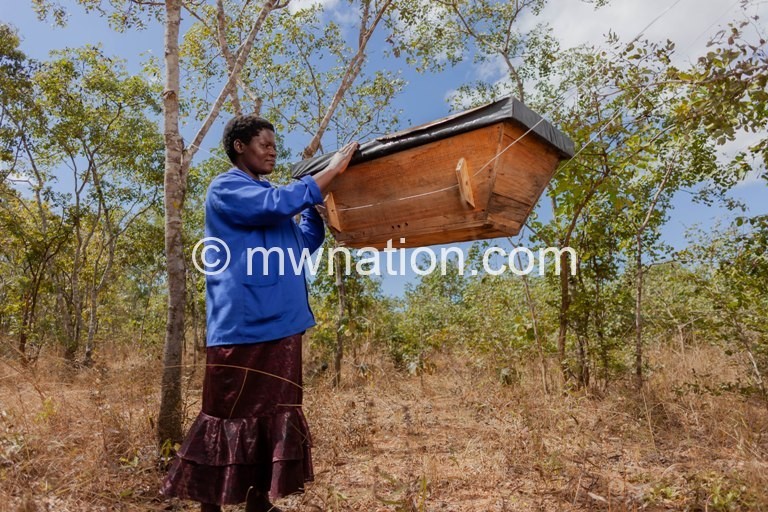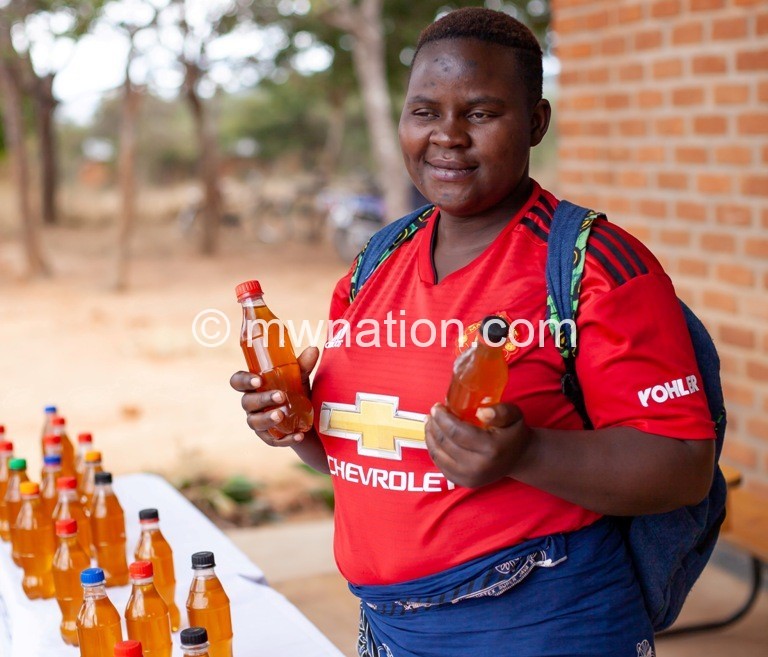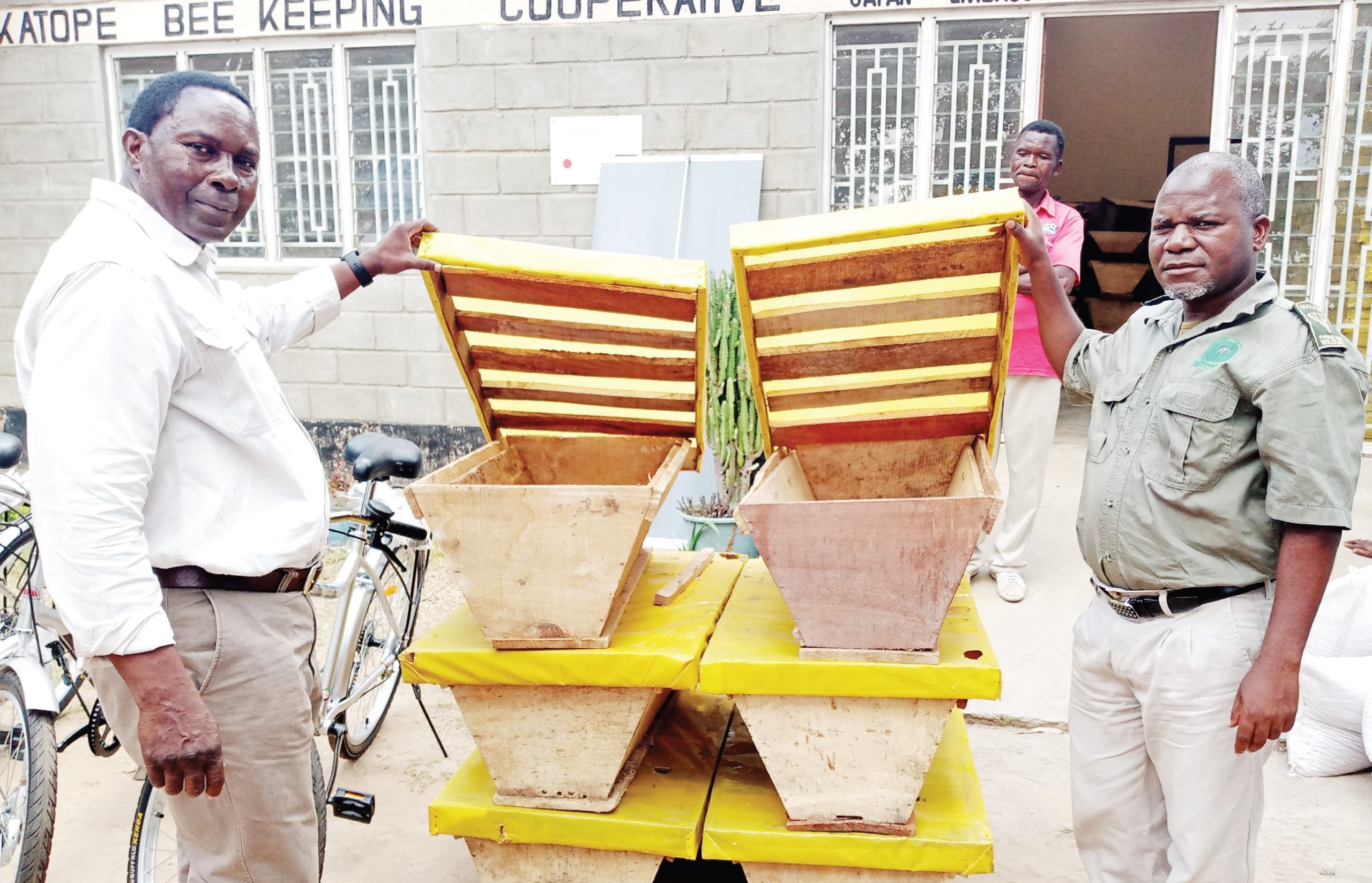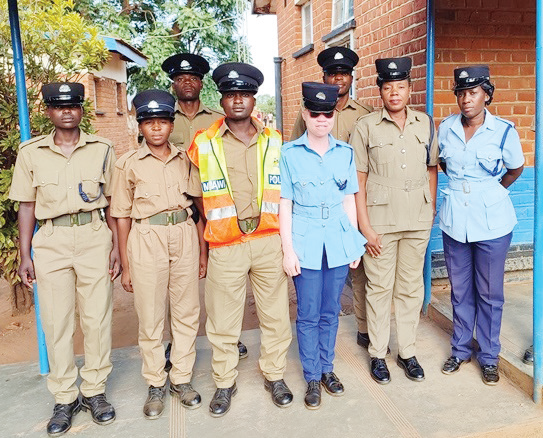Bumper harvest from diversity
Under the glorious shades of natural trees on the sliding plateaus of village headman Robert in Kameme, Chitipa, hang bulky wooden containers. To strangers, they trigger a feeling that one has trespassed into a graveyard. In reality, though, the coffin-shaped boxes are improvised bee homes.
In this forest that covers about three kilometers, there are 41 boxes belonging to Vitumbiko Farmers Club.

The group went into bee-keeping to supplement on their revenue from crop farming. Today, they are well established as their production has increased to incredible proportions.
“We had few locally made bee boxes. However, about two years ago, through the Kulima project we were given 26 modern boxes to take our total to 41,” recalls Maggie Silumbu, one of the founding members.
The club’s growth has been initiated by Kulima Extension Training Transforming Economic Returns (Better), a five year project which Self Help Africa (SHA) is implementing in collaboration with other non-governmental organisations namely Action Aid Malawi, Adventist Development and Relief Agency, Plan International and Evangelical Association of Malawi.
Rolled out in 2017, the Kulima Better project targets Chitipa, Karonga, Thyolo, Mulanje, Chiradzulu, Mzimba, Kasungu, Nkhata-Bay, Salima and Nkhotakota districts.
According to SHA, its overall objective is to increase resilience, food and nutrition and income security of over 400 000 smallholder farmers through strengthening of agricultural extension, increasing the farmers’ capacities to adapt to adverse effects of climate change and improve food security.

Back at the Vitumbiko Farmers Club, Silumbu says they make around K500 000 from each round of honey harvest but, with better markets, their earnings could more than double.
“We sell the honey through markets within our area. Since we are a low income community, we cannot charge exorbitantly, hence we scare our customers. What we want now is to establish links with companies. We could be getting better prices,” she forecasts.
Despite the low prices, Silumbu says, through the honey production, the club’s members are economically better than in the deep past.
“We use the earnings to buy farm inputs like fertiliser. Some farmers, like me, have constructed good houses from funds raised through honey production,” she explains, with emphasis.
Venelesi Chimpesa, Kulima Better development facilitator pointed out that they supported bee farming in the area so as to empower farmers to realise their dreams of having alternative ways of wealth creation.
“Apart from bee farming, they also grow crops. We support them because it helps them generate extra income to ensure they feed their families and buy other needs like farm inputs,” she expounds.
In Karonga district, where rice is a dominant crop, the project is pushing farmers into crop diversity with some adding bananas, sesame and fish farming to their list.
John Bosco Msukwa of group village Headman Mwakawanga in Traditional Authority Kyungu used to grow sesame but he quit the industry following low prices that rocked the market. Today, through the Kulima Better project, he has revived the crop.
Sesame seed is a common ingredient in various cuisines. It is used whole in cooking for its rich, nutty flavour. Its seeds are sometimes added to breads, including bagels and the tops of hamburger buns.
“Before the project was introduced here, I was only relying on maize as my cash and food crop. It was tough to sustain my family because I was not making enough money.
“But through the project, SHA gave me sesame seeds. I am now growing sesame on five acres of land and generating enough money to sustain my life. I have managed to finalise construction of my house. This year, I have realised K1 million which I will use to buy a motorcycle,” he says.
In Kasungu, the Kulima Better project is, among other areas, is focusing on empowering farming families to increase their yields through use of organic fertiliser.
Grace Mwale from Bob Village Traditional Authority Simlemba is one of the beneficiaries of the programme. She has been trained on how to make the fertiliser whose production relies on locally-found materials.
“We mix water with manure from animal wastes, maize husks, ash and 50 kilogrammes [kg] of chemical fertiliser to produce five bags of 50 kg of organic fertiliser,” she reveals the formula.
Mwale hails the fertiliser as cost effective revealing she used to spend over K100 000 on inorganic fertiliser but now she spends half of that while returning better harvests.
“Previously, I used to apply four bags of chemical fertiliser on one acre of maize field. I could harvest around 25 bags. But with the use of organic fertiliser, which I used for the first time this year, I have yielded 70 bags from the same piece of land,” she claims.
SHA’s chief of party Peter Soko disclosed that the Kulima Better has helped to improve food security in the targeted households.
“The project has recorded a 6.96 percent increase in the number of households with enough food lasting from one farming season to another while the number of households with savings has jumped by 19.63 percent,” he said.
“There is also a four percent increase in household asset accumulation while the households’ absorptive capacity against shocks such as droughts has risen by 11.8 percent.”
Soko adds that the project which also promotes Village Savings and Loans (VSL) groups “has improved access to finance for most of the project beneficiaries. A total of 2 562 VSLs have been established with a total membership of 40 455.”
The programme implementation has, in the meantime, been disrupted by Covid-19 pandemic, pushing SHA and its implementing partners to re-strategise in a bid to make it more effective.
“Covid-19 has affected the implementation of some key activities specifically the dissemination of best practices because of the strict measures put in place to prevent its spread. Moving forward, the project will use other channels such as mobile phones, radio and television to complement the agriculture extension services,” he states.





